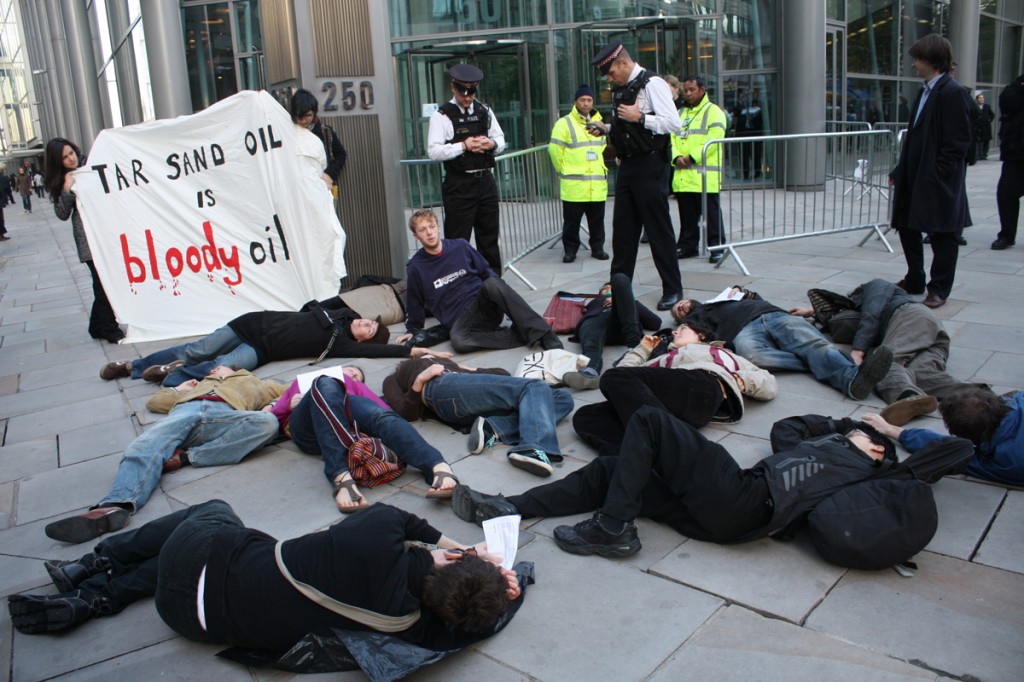“This is your money that is being used to bankroll the tar sands,” said Eriel Tchekwie Deranger, a member of the Athabasca Chipewyan First Nation, speaking to a roomful of members of parliament, politicians, aides, lawyers, journalists, and representatives from NGOs at the House of Commons in London, England today.
Tchekwie Deranger, the Freedom from Oil Campaigner for the Rainforest Action Network, was in the British capital to discuss the involvement of British financial institutions in the Alberta oil sands, joined by Heather Milton Lightening of the Pasqua First Nation in Saskatchewan and the Indigenous Environmental Network, and Melina Laboucan-Massimo, a member of the Lubicon Cree in Alberta and a campaigner with Greenpeace Canada. This is the second trip to the UK for Milton Lightening, who attended the Climate Camp in September to raise awareness among English activists about the involvement of British institutions in the sands and subsequently staged a protest in front of BP headquarters.
The tar sands, or oil sands, cover a large portion of Canada’s western province of Alberta estimated to be roughly the size of England. Considered to be one of the world’s second largest oil reserves (second only to Saudi Arabia), the region – a mixture of bitumen, sand and rock, mined to the tune of 1.3 million barrels a day.

“This is the most destructive industrial project on the face of the planet,” said Laboucan-Massimo, listing a number of statistics: up to four barrels of fresh water are used to extract one barrel of oil from the sands; after use, the water contains levels of polycyclic aromatic hydrocarbons (PAHs), heavy metals and other chemicals of concern considered too high to be released and is collected in large tailing ponds, visible from space, and which are considered by some to be the largest man-made structures ever created; and extraction produces four times more greenhouse gases per unit than conventional oil extraction.
“We urge you to use your majority shareholder position with the banks to challenge investments in the tar sands,” said the Freedom from Oil Campaigner for the Rainforest Action Network, referring to the financial “bail outs” and nationalisations of the past year. The British government now holds more than 70 per cent of the Royal Bank of Scotland’s shares. In early November RBS announced it had raised $2.3bn) in finance for Britain’s onshore wind industry as part of a consortium.
Since 2007 RBS has invested an estimated $13.7 bn (US) in loan guarantees or debt and equity underwriting to energy companies with projects in the tar sands. An estimated 18 per cent of the stocks on the London Stock Exchange are invested in either Shell or British Petroleum, both of which are invested in the tar sands.
Tchekwie Deranger had been invited to Parliament by Liberal Democrat MP Simon Hughes, spokesman for Energy and Climate Change. A month previous she was ejected from the House of Commons in Ottawa, Canada during question period, an incident that was widely broadcast on television that evening, and subsequently saw her banned from Canada’s Parliament for a full year. She was subsequently invited to the British Parliament by MP Hughes.
“I can’t help but find that funny,” she said.
“I find it interesting that we sit here staring out at the Shell building across the river – and there’s British Petroleum over there,” said Hughes, gesturing out the window across the Thames. “I will try to broker talks between industry and environmental groups here in the UK, and to try and raise the issue in the national and local press,” he offered at the meeting’s conclusion.
Campaigners allege there are legal grounds with which to challenge RBS, which in 2003 was a signatory of Equator Principles, a set of standards for environmentally and socially responsible lending practices.
“Additionally, I find it alarming that the UK is a signatory of the declaration of indigenous rights and yet prior consent has not been given,” said Tchekwie Deranger. “This project is therefore a direct violation of international conventions.”
Milton Lightening stressed that the environmental impacts of the tar sands are not limited to Canadians; the greenhouse gas emissions from the region are so large, she contested, that they alone could precipitate ‘runaway’ climate change beyond two degrees Celsius, the minimum level considered manageable. “We will be the tipping point for the entire planet.”
Following their parliamentary meeting, the three women were granted their request for a formal meeting by RBS. “This is huge – the Royal Bank of Canada has turned us down a hundred times,” said Tchekwie Deranger.

After staging a pre-arranged “die-in” protest outside the headquarters of RBS with English student activists, who labelled the tar sand products “bloody oil,” the three attended a meeting with the head of sustainability for RBS, a position Tchekwie Deranger describes as “quasi-relevant – his ability to make any changes in RBS is extremely limited.”
“But he said he would look into it.”
The tar sands, little known in England until September, are increasingly better known to the British public, in addition to politicians and investors. This autumn People & Planet, the UK’s largest student campaigning network, designated the tar sands a key campaigning issue. It is anticipated that international efforts – particularly from the UK – could pressure the Canadian government to scale the operation down, as they did following European boycotts on virgin timber in the 1990s.
Says Milton Lightening: “Canada really cares what the UK thinks of it.”